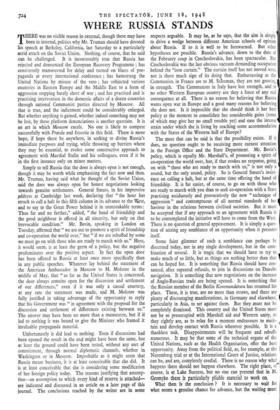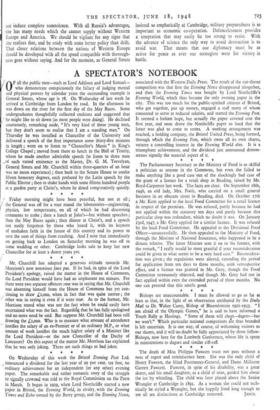WHERE RUSSIA STANDS T HERE was no visible reason in external,
though there may have been in internal, politics why Mr. Truman should have devoted his speech at Berkeley, California, last Saturday to a particularly acrid attack on the Soviet Union. Nothing, of course, that he said can be challenged. It is incontestably true that Russia has rejected and denounced the European Recovery Programme ; has consistently manoeuvred for delay and turned on blasts of pro- paganda at every international conference ; has hamstrung the United Nations by misuse of the veto ; has subjected various countries in Eastern Europe and the Middle East to a form of aggression stopping barely short of war ; and has practised and is practising intervention in the domestic affairs of a dozen countries through national Communist parties directed by Moscow. All that is true, and the indictment could be considerably enlarged. But whether anything is gained, whether indeed something may not be lost, by these platform denunciations is another question. It is an art in which Moscow excels. No one is likely to compete successfully with Pravda and Izvestia in this field. There is more hope, if hope there be anywhere, in seeking to divine Russia's immediate purposes and trying, while throwing up barriers where they may be essential, to evolve some constructive approach to agreement with Marshal Stalin and his colleagues, even if it be in the first instance only on minor matters.
Simply to tell Russia that the door is always open is not enough, though it may be worth while emphasising the fact now and then. Mr. Truman, having said what he thought of the Soviet Union, said the door was always open for honest negotiations looking towards genuine settlements. General Smuts, in his impressive Address at Cambridge last week, declaring that " the hour has struck to call a halt io this fifth column in its advance to the West, and to say to the Great Power behind it in unmistakable terms : Thus far and no farther," added, " the hand of friendship and the good neighbour is offered in all sincerity, but only on that irrevocable condition." Mr. Bevin, speaking in London on Tuesday, affirmed that " we are out to promote a spirit of friendship and co-operation the world over," but " if we are rebuffed by some we must go on with those who are ready to march with us." Here, it would seem, is at least the germ of a policy, but the negative predominates over the positive aspect. In fact the open door has been offered to Russia at least once more specifically than in any public speeches. Whatever lay behind the statement of the American Ambassador in Moscow to M. Molotov in the middle of May, that " as far as the United States is concerned, the door always remains open for the discussion and settlement of our differences," even if it was only a casual courtesy, at any rate the statement was made, and M. Molotov was fully justified in taking advantage of the opportunity to reply that his Government was " in agreement with the proposal for the discussion and settlement of differences existing between us." The answer may have been no more than a manoeuvre, but if it led to nothing it was bound to give the Minister who framed it invaluable propaganda material.
Unfortunately it did lead to nothing. Even if discussions had been opened the result in the end might have been the same, but at least the ground could have been tested, without any sort of commitment, through normal diplomatic channels, whether in Washington or in Moscow. Improbable as it might seem that Russia meant business, it is at least conceivable that she did. It is at least conceivable that she is considering some modification of her foreign policy today. The reasons justifying that assump- tion—an assumption to which every kind of reserve is attached— are indicated and discussed in an article on a later page of this journal. The conclusions reached by the writer are in some respects arguable. It may be, as he says, that the aim Is simply to drive a wedge between different American schools of opinion about Russia. If so it is well to be forewarned. But other hypotheses are possible. Russia's advance, down to the date of the February coup in Czechoslovakia, has been spectacular. But Czechoslovakia was the last obvious vacuum demanding occupation behind the "iron curtain." The curtain itself has not moved west, nor is there much sign of its doing that. Embarrassing as the Communists in France are to M. Schuman, they are not growing in strength. The Communists in Italy have lost strength, and in no other Western European country are they a force of any real consequence at all. There is no reason for believing that Russia wants open war in Europe and a good many reasons for believing she does not. Is it impossible that she should think it her best policy at the moment to consolidate her considerable gains (some of which may give her no small trouble yet) and ease the intense strain under which she is living by reaching some accommodation with the States of the Western half of Europe?
The most that can be said is that the possibility exists. If it does, no question ought to be receiving more earnest attention in the Foreign Office and the State Department. Mr. Bevin's policy, which is equally Mr. Marshall's, of promoting a spirit of co-operation the world over, but, if that evokes no response, going, on with " those who are ready to march with us," is not only a sound, but the only sound, policy. So is General Smuts's insist- ence on calling a halt, but at the same time offering the hand of friendship. It is far easier, of course, to go on with those who are ready to march with you than to seek co-operation with a State practising assiduously and provocatively the new " technique of aggression" and contemptuous of all normal standards of be- haviour in the relations between civilised societies. But it must be accepted that if any approach to an agreement with Russia is to be contemplated the initiative will have to come from the West. There is no question of general appeasement. It is simply a ques- tion of seizing any semblance of an opportunity when it presents. itself.
Some faint glimmer of such a semblance can perhaps be discerned today, not in any single development, but in the com- bination of several. It is tragic that we should have to try to,. make much of so little, but as things are nothing better than that can be hoped for. It is something that Russia should have con- sented, after repeated refusals, to join in discussions on Danube navigation. 'It is something that new negotiations on the increase of Anglo-Russian trade are being opened. It is something that the Russian member of the Berlin Kommandatura has resumed his place. These, it is true, are no more than straws, and there are plenty of discouraging manifestations, in Germany and elsewhere,' I particularly in Asia, to set against them. But they must not be completely dismissed. This country and the United States must not be so preoccupied with Marshall aid and Western unity, as they rightly are, as to relax for a moment endeavours to main- tain and develop contact with Russia wherever possible. It is a thankless task. Disappointments will be frequent and rebuffs numerous. It may be that some of the technical organs of the United Nations, such as the Health Organisation, offer the best opportunity. Away from the political field, as, for example, at the Nuremberg trial or at the International Court of Justice, relations can be, and are, completely cordial. There is no reason why what happens there should not happen elsewhere. The right place, or course, is at Lake Success, but no one can pretend that in M. Gromyko there is particularly pliable material to work on.
What then is the conclusion ? It is necessary to waif for what seems a genuine chance for advance, but the waiting must not' induce complete somnolence. With all Russia's advantages, she has many needs which she cannot supply without Western Europe and America. We should be vigilant for any signs that she realises that, and be ready with some better policy than drift. That closer relations between the nations of Western Europe should be developed with all the speed compatible with thorough- ness goes without saying. And for the moment, as General Smuts insisted so emphatically at Cambridge, military preparedness is as important as economic co-operation. Defencelessness provides a temptation that may easily be too strong to resist. With the advance of science the only way to avoid destruction is to avoid war. That means that our diplomacy must be as active for peace as ever our strategists were for victory in battle.



































 Previous page
Previous page